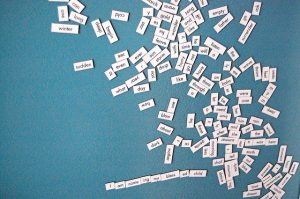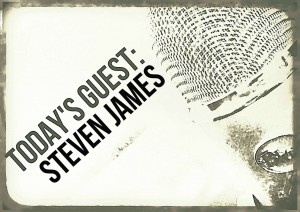Posts by Steven James
Flickr Creative Commons: Dave Morrison Photography
Let me guess.
Ideas distract you and scratch away at your attention so much that sometimes it’s tough to be present, really present, when you’re with other people.
Maybe the scent or sizzle of burgers on the grill at the neighborhood BBQ takes you back to your childhood, to a story waiting there that you haven’t thought about in years. And suddenly you’re no longer there with your friends, but someplace else. Somewhere in your head.
The people you’re with will notice this, of course, and might think that you’re either rude or aloof. So there’s that. But there are also those times when you are present, listening to your friends in a way that others don’t—grasping the hard truth and soft emotion and life and love and passion hidden beneath their words.
And so people don’t know what to make of you.
You’re a writer. You believe in once upon a time. You channel your dreams. You wrestle with words in ways that are hard to even define. Angels and fairies won’t leave you alone. Thoughts of the bogeyman still keep you up at night.
Writing a book devours your time—and since time is life, that means it’s consuming huge, unrecoverable chunks of your precious, momentary, miraculous life. But for some reason that doesn’t bother you. It inspires you. And drives you to write even more.
Unless you’re a prodigy or a literary genius, it probably takes you about a month to write what it takes people an hour to read. So you might legitimately be investing a thousand hours or more into a novel—a thousand lonely hours in solitary confinement.
But it isn’t so solitary. Because when you’re alone with your story, you’re never really alone. The characters keep you company. The story gets the best of you and time races by.
You know what it’s like to wake up at 2 AM with an idea, and slip out of bed so you don’t wake your partner, and then tap away at the keyboard in the basement for four hours until you make your way back under the covers to try sneaking in a little more shuteye before you need to get up and go to work for the day.
Which you do.
In order to pay the bills.
Until this writing thing takes off.
Even if that takes forever.
Read MoreFlickr Creative Commons: Norm Lanier
I love roller coasters.
There’s nothing like the anticipation of riding up to the first drop, or being caught in that hover-quiver breath-holding gasp of time when you know you’re about to plummet three hundred feet after just a few more slim clicks of that chain on the track beneath you.
And then.
You do.
Over the years, as a coaster connoisseur, I’ve been to both Disney World in Orlando, Florida and Cedar Point amusement park in Sandusky, Ohio.
Two very different parks.
Two very different experiences.
Cedar Point is the roller coaster capital of the world with 18 world-class coasters. From what I understand, it was the first park to build a complete circuit roller coaster with a two-hundred-foot drop (Magnum XL-200), the first three-hundred-foot drop (Millennium Force) and the first four-hundred-foot drop (The Top Thrill Dragster).
As you can imagine, I’m right in my element at Cedar Point.
Disney World, on the other hand, is more interested in creating an immersive experience while you’re waiting in line. Sure there are coasters, but the emphasis isn’t on building the world’s fastest or tallest, but the story that goes along with the thrill.
Everything is centered around story. The buildup to the rides, the rides themselves—it all fits into a narrative that begins the moment you get in line. As you come closer and closer to boarding the Tower of Terror, for example, there’s a specific mood that’s introduced: a setting, a character, all laid out to tell a story.
At Cedar Point, each ride is unique and exciting. Sure there’s a clever name and a cool logo, but there isn’t such an emphasis on narrative as there is at Disney.
So which approach is better—spectacle or story?
Recently, as I reflected on this question I was surprised by my answer.
As a novelist who is also a huge proponent of raising the bar of excellence in storytelling, I naturally suspected that I would fall into the story camp. (I have a master’s degree in storytelling after all, and have spent the last twenty years teaching it around the world, if that’s any clue to how addicted I am to story.)
But, after a recent trip to Cedar Point, I realized I was torn.
Yes, while you’re waiting in line, Disney’s theme-based and intricately-told stories are more engaging, but those coasters at Cedar Point are just so dang fun.
The parks appeal to patrons in different ways. And, for me, there are different reasons to go to the two destinations.
Entertainment—Disney.
Anticipation—Cedar Point.
It’s sort of like when I go to a movie theater to watch a film that’s action-packed with amazing stunts or impressive special effects. I go in knowing that the plot might not be the best in the world, but I want that thrilling experience—to be blown away and not to think too hard about everything. With this in mind, I’m able to enjoy some movies that have lots of explosions, car chases, fight scenes, and intense sequences but little character development or a well-synthesized plot.
There are just those times when I want to fly down a 400-foot drop at 120 miles per hour and that’s all I want.
Read Morephoto by Jon Fife
Odds are, you’re trying to write too many words a day.
You’ve probably heard that you should write a thousand words per day. Or two thousand. Or five. Or ten.
Or maybe you signed up for a program in which you (supposedly) write a novel in a month. But for whatever reason, you’re trying to hit an arbitrary “word count” each day and if you don’t hit it you end up feeling somehow disappointed in yourself.
I tried that routine for a while.
One day in ten hours I pumped out six thousand words and I felt way ahead. Amazing! So productive! If I could do that every day…
Oh, yeah.
So then the next day I spend the same amount of time writing, and wrote exactly one word.
Yes.
One.
In ten hours.
Of course, I typed in more words, and then revised, deleted, rewrote, and so on, ending the day just one word further into the book.
That was the last time I tried to hit a certain word count. It was just too depressing and the ups and downs of good days and bad days wasn’t helping motivate me.
The whole paradigm strikes me as an odd way to go about producing works of art.
I’ve even heard authors say, “I’ll write until I reach my word count and then stop. It might be at eleven o’clock in the morning, or at eight o’clock at night. I know the book will be eighty thousand words, so that means I will be writing eighty days.”
Think of asking a song writer “How many notes do you write in a day?” Or asking a carpenter how many cuts he makes, or a painter how many times she dips her brush in the paint every day.
I’m guessing most composers, most carpenters, most painters don’t keep track. And yet, when it comes to writers, word count has become a big deal, a measure of progress, and even of proficiency.
A movie director doesn’t say, “We’re going to shoot ten minutes of the movie today and then we’re going to stop. We might get done at eleven o’clock in the morning and then you’ll have the rest of the day off. Every day we’re going to shoot exactly ten minutes of the movie. This film will be precisely two hours and ten minutes long, so it will take us twenty-six days to shoot.”
How could you know exactly how long a film will be until you’ve filmed it? How can you know how long it will take to get a scene right or how many takes you’ll need?
Read MoreTwelve years ago I decided to sell out.
I landed on an idea that I felt would be a financially lucrative novel series. I’d been reading the fiction bestsellers at the time and I realized that they were, to a large degree, formulaic, trite, fast-moving, and written on about a fourth-grade reading level.
I thought I could certainly write that poorly. It would require less revision, fewer edits, and I could pump out the books much faster, probably producing several per year.
All it would require was me being less insanely neurotic about quality. I figured that mediocrity would actually boost my career and help me put away more money for my daughters’ college education one day.
So, I put together a book proposal for the new series and spun out a few sample chapters. My agent sent it out, and it made it to the pub boards of two of the New York publishers.
I admit that I was excited when I flew up to New York City to meet with editors to discuss the book, which we were hoping to put on auction—but in the end it didn’t sell.
Thankfully, oh thankfully, that series didn’t sell.
It would have sent me down a career path that I know, and (if I’m honest with myself), that I knew at the time, wouldn’t have been one I could be proud of.
Not long after that, I had an opportunity to ghostwrite for one of the biggest names in publishing. “You’ll make a lot of money,” my agent told me. “You’ll be a New York Times bestseller.” So, I had to figure out what to do. Write my own stories, even though they didn’t have Mr. Famousguy’s name on the cover, or go ahead and write stories for him, make a ton of money, buy myself some time, and then go write my own books after I’d cashed the check.
It wouldn’t have been immoral. I’m not judging ghostwriters. I have many friends who ghostwrite and I’ve done work for hire myself. In this case, the bigger question was whose stories I was going to spend my life telling. It would have been a lucrative job at a point in my career when I could really have used the money.
At that time, my daughters were young, and one day as we were driving home, I was talking in the front seat with my wife about the possibilities of the ghostwriting.
I guess I didn’t even think they were listening in, but kids have a tendency to do that—especially when we don’t think they are.
When there was finally a pause in our conversation, my youngest daughter asked me, “So what are you going to do, Daddy?” She was maybe five at the time.
I was about to tell her that I was planning to help this other man write his stories, but right before I answered, I felt a nudge deep in my heart to say something different.
Read MoreSo, here’s the job I’m offering you.
There are no benefits. No dental, medical, or retirement. You get no days off. No sick leave. No personal leave. No vacation time. There’s no job security.
You get to pay your own taxes.
Seniority means nothing.
You’ll be on the hook for any college classes or professional conferences or online courses you sign up for. Degrees in this field will do little or nothing to land you a position or put you ahead of the other applicants.
And there will be plenty of them.
Hundreds of thousands.
Applying daily.
Any compensation at all is uncertain, wildly sporadic, and if you do get paid, the person who helped you land your job will get fifteen percent of everything you make. Forever.
There’s no bonus for working overtime. In fact, you’ll probably put in some form of overtime nearly every day for the rest of your life.
Long hours? You better believe it.
An ergonomically designed office? Unlikely. That cluttered corner of your basement will probably have to do.
If you don’t like feeling pressured, under the gun, stressed, or overwhelmed, this position isn’t going to be a good fit for you.
Read MorePlease welcome Steven James, the critically acclaimed author of thirteen novels. He serves as a contributing editor to Writer’s Digest Magazine, hosts the biweekly podcast The Story Blender, and has a master’s degree in storytelling. Publishers Weekly calls him “[a] master storyteller at the peak of his game.”
Steven’s groundbreaking book Story Trumps Structure: How to Write Unforgettable Fiction by Breaking the Rules won a Storytelling World award as one of the best resources for storytellers in 2015. When he’s not working on his next novel, Steven teaches Novel Writing Intensive retreats across the country with New York Times Bestselling author Robert Dugoni.
There are dozens of plot, structure, and outlining books out there, but almost no one teaches organic writing—and yet some of the most popular authors in the world write organically (Stephen King, Dean Koontz, and Lee Child, to name a few). I believe people can write better, more original, and more twist-filled stories by abandoning their outlines and trusting the narrative forces of believability, causality, and escalation.
Connect with Steven on his blog, on Twitter, and on Facebook.
How to Abandon Your Outline to Improve Your Story
On February 2, 2014, The Sunday Times related an interview with J.K. Rowling in which she admitted that she wrote the Hermione/Ron relationship as a form of wish fulfillment.
“That’s how it was conceived, really,” she said. “For reasons that have very little to do with literature and far more to do with me clinging to the plot as I first imagined it, Hermione ended up with Ron . . . It was a choice I made for very personal reasons, not for reasons of credibility.”
When she clung to her preconceived plot idea it didn’t lead her toward, but away from, credibility.
This is a common problem when we outline.
But are there ways to move past that? To jettison an outline and respond to the story as it develops?
Yes.
Here’s how to get started.
Focus on story, not plot.
At the heart of a story is tension, and at the heart of tension is unmet desire. So, at its core, a story isn’t primarily about what a character does, but what he pursues.
This pursuit, driven by desire, escalates as the character faces mounting setbacks on the way to a
satisfying climax.
Plot is the byproduct of pursuit, not its precursor.
As Ray Bradbury noted, “Remember: Plot is no more than footprints left in the snow after your characters have run by on their way to incredible destinations. Plot is observed after the fact rather than before. It cannot precede action. It is the chart that remains when an action is through.”
So, focus on the actions that your character takes in pursuit of his unmet desire. Let every choice in every scene be shaped by that pursuit, not by your preconception of what should happen to get “to the next plot point.”
Let context guide you.
Make sure that the character is sufficiently motivated to go to that next scene.
Often, when working from an outline, the choices the character makes end up being dictated not within the context of the scene—what makes sense in that moment—but from an authorial preconception of where things should go.
Read More













